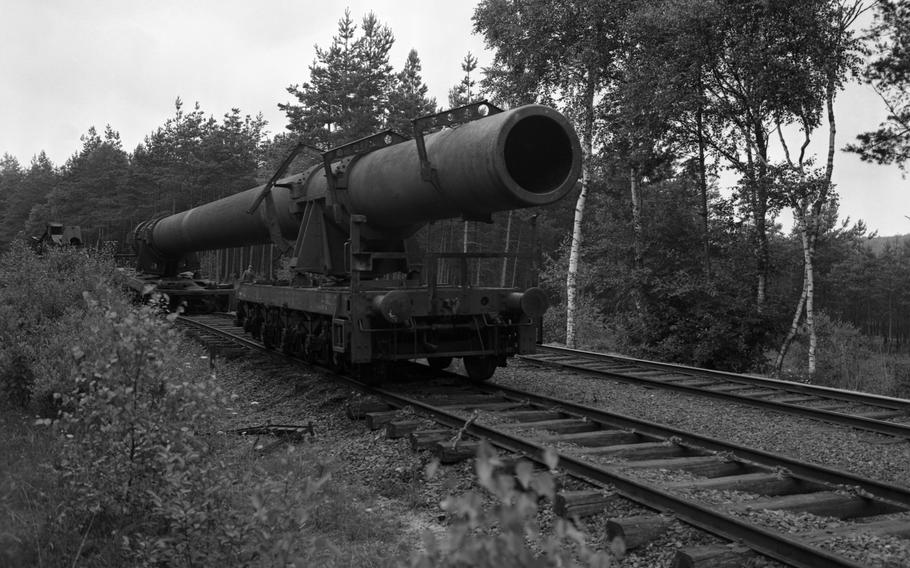
A massive Nazi Germany produced railway gun is disassembled in the woods near Grafenwohr, Germany, by American forces in July 1949. (Stars and Stripes)
World War I was the “Great War” before World War II. As a global conflict unfolded in the late 1930s in Europe and Asia, it took on the name “World War II” and the “Great War” became “World War I.”
The names made sense. The Great Depression itself was a major contributing factor to the development of fascist regimes in Germany, Japan and Italy. Yet World War II was very much a continuation of World War I since Germany in particular was determined to strike back at the Allies for the harsh terms of the Treaty of Versailles, notably the extremely high reparations they were forced to pay to European countries.
Since the onset of the Cold War, the United States, Great Britain, France and other European countries have taken every possible measure to avoid “World War III.” Indeed, the Cold War itself, which pitted two major nuclear powers against each other, seemed to have arrived at the recipe for avoiding another world war — the fear of nuclear war itself.
Russia has threatened Ukraine and the NATO countries that it would use nuclear weapons against Ukraine if the NATO countries crossed various red lines that would threaten Russia’s existence. Recently, former Russian President Dmitry Medvedev cautioned the NATO countries again to back off from Ukraine and attacks of Russians in Russia itself.
Yet political and business leaders and pundits in the West, including Jamie Dimon, CEO of JP Morgan, and Washington Post columnist and author George F. Will are talking again about the prospects of World War III and even saying that this war has begun.
The Russia-Ukraine War and the Israel-Hamas war are the two focal points of the war either in process or on the verge of erupting. Russia, China, Iran and North Korea are the updated Axis Powers and the United States, Great Britain, France, and the other NATO countries as well as Israel, Ukraine, South Korea and Japan are the updated Allied Powers.
Although it is possible that a massive nuclear war would erupt, this seems unlikely. The world would virtually disintegrate if both sides engaged in nuclear war.
Thus the Cold War framework still applies to an important extent. The United States, Russia, Great Britain, China, France, North Korea and Israel have little motivation to attack their enemies with nuclear weapons.
At the same time, each of these countries may get pulled into regional wars that could be the cause of World War III. The Russia-Ukraine war now involves 10,000 North Korean troops, and the United States may be on the verge of launching offensive attacks on Iran if Iran continues to attack Israel.
World War III may end up being a major European and Middle Eastern conventional war the way World War II was a major European and Asian war, save for the final days of the Asian war.
If there are going to be two regional wars, these wars could be on a much lesser scale than the two wars in World War II. In Europe — and of course North Africa — the war Hitler, Mussolini and other fascist countries were fighting against the Allies was not focused on one country, like Ukraine. World War II in Europe was focused on the control of Europe itself, including Russia — which straddles Europe and Asia — as well as the United States.
The war in the Pacific was also not focused on one country, like Israel; it was instead broadly concerned with the control of Asia itself, including China and the islands in the Pacific.
We do not want two regional wars that engage the troops of over a dozen countries, but it is best to conceptualize the problem in terms of two regional wars that need not involve nuclear weapons or become an all-out conventional war.
Of course, it would be best to resolve the two wars going on right now and block their expansion. But if they are going to expand, this does not mean that we have arrived at World War III. Ideally, two regional wars would never rise to the level of a conventional World War III or a nuclear World War III.
In essence, Ukraine and Israel, Hamas and the Palestinians do not provide a sufficient basis for a World War.
Dave Anderson has taught political philosophy at the University of Cincinnati, Johns Hopkins University and George Washington University and is the editor of the interdisciplinary volume Leveraging: A Political, Economic, and Societal Framework.